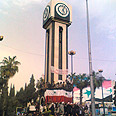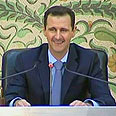

Syria's government approved lifting the country's nearly 50-year-old state of emergency Tuesday to meet a key demand of anti-government protesters, but opposition leaders dismissed it as an attempt by President Bashar Assad to claim reforms but maintain his hard-line rule.
The blunt response suggested the month-old uprising could be entering a more volatile stage: protesters now aiming higher to seek Assad's ouster and his regime warning that the demonstrations must now end.
The ultimatum-style message appeared to show that ending emergency laws will not ease the increasingly harsh blows against opponents. Assad's regime has labeled the protest movement as an "armed insurrection" and a power grab by Islamic extremist - descriptions that could give authorities the cover to continue the crackdown.
Assad last week had told his cabinet to remove the state of emergency - in place since his Baath Party took power in March 1963 - but added that such a move would give protesters no more reason to take to the streets. This could give Assad further pretext to move against any further marches or rallies.
Syria's official news agency SANA said the cabinet also approved abolishing the state security court, which handled the trials of political prisoners, and approved a new law allowing the right to stage peaceful protests with the permission of the Interior Ministry. The changes need parliament approval, but no objections are expected at its next session planned for May 2.
"Repealing the emergency law would do little to restrict the power of various security agencies because Syria has other laws that guarantee members of the secret police immunity for virtually any crime committed in the line of duty," said Mohamad Bazzi, a regional expert at the Council on Foreign Relations in New York.
Protestors undeterred
Less than an hour after the announcement, a pro-democracy demonstration erupted in the restive coastal city of Banias, which had witnessed an intense security crackdown last week.
"We want freedom!" chanted thousands of people in the southern city of Daraa and coastal town of Banias, according to witnesses.
"This (announcement) is all just talk. The protests won't stop until all the demands are met or the regime is gone," leading opposition figure Haitham Maleh, an 80-year-old former judge, told Reuters.
A prominent Syrian writer Yassin Haj Saleh, who spent 16 years in jail for his links to a pro-democracy group, claimed Assad was looking for a "maneuver to gain time" by removing emergency rule, which gives authorities almost boundless powers of surveillance and arrest.
"They are basically telling the people, `We have fulfilled your demands, so go home and if you don't will break your head,'" he told The Associated Press by telephone from Beirut. "But in reality nothing will change."
US unsure about draft law
The United States is unsure that Syria's draft law to lift emergency rule will be less restrictive, a State Department spokesman said on Tuesday.
"It's unclear whether they've passed legislation to lift the emergency law, but that a new law requiring protesters that - to receive permission from the Interior Ministry before holding demonstration may be - may be in play here," State Department spokesman Mark Toner said.
In light of some of the comments from Syria's interior minister, "this new legislation may prove as restrictive as the emergency law it replaced," Toner said.
Toner also said that violence overnight by soldiers firing on protesters continued "to raise serious concerns and it remains clear that the Syrian government needs to urgently implement broader reforms and ... to cease violence against peaceful protesters."
Most of Syria's 23 million people were born or grew up under the strict control of the state of emergency that, among other things, puts strict control on the media, allows eavesdropping on telecommunications and permits arrests without warrants from judicial authorities.
The regime had claimed the reason for the emergency rule is because of the technical state of war with archenemy Israel, but rights groups and others say it was mostly used to as the backbone of the authoritarian system.
Earlier on Tuesday, it was reported that Syrian security forces opened fire on hundreds of anti-government protesters staging a sit-in, shooting live ammunition and tear gas before chasing them through the streets for hours. Witnesses reported four were killed in the clashes.
They shot at everything, there was smoke everywhere," an activist in the central city of Homs told The Associated Press by telephone, asking that his name not be used because he feared for his personal safety. "I saw people on the ground, some shot in their feet, some in the stomach."
AP and Reuters contributed to this report
- Follow Ynetnews on Facebook















